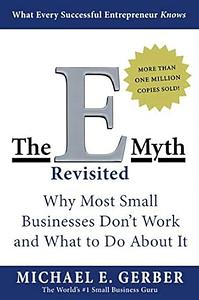Take a photo of a barcode or cover
286 reviews for:
The E-Myth Revisited: Why Most Small Businesses Don't Work and What to Do About It
Michael E. Gerber
286 reviews for:
The E-Myth Revisited: Why Most Small Businesses Don't Work and What to Do About It
Michael E. Gerber
Very interesting and inspiring first 1/3-1/2, although quite longer than it needs to be. Rest feels like being drowned in authors weird metaphors and ego.
challenging
hopeful
informative
medium-paced
Not bad
The idea of creating a system that runs the business and hiring people to run the system is so very simple, yet when you look at the giant businesses that is exactly what they do. Create a system with processes and then analyse, compare, track and generally stop making wild guesses about what may or may not be working. Look at McDonald's and go from there, they are the quintessential business run by a system.
The idea of creating a system that runs the business and hiring people to run the system is so very simple, yet when you look at the giant businesses that is exactly what they do. Create a system with processes and then analyse, compare, track and generally stop making wild guesses about what may or may not be working. Look at McDonald's and go from there, they are the quintessential business run by a system.
I remember when I read this I took a lot away from it. I was just starting out in my photography business and so much was relevant.
"The E-Myth Revisited" by Michael Gerber offers profound insights into the distinctions between 'makers' and 'entrepreneurs.' As a Catholic priest working full-time in the media, I've had to self-finance my activities. This book taught me an invaluable lesson about my approach to 'business.' Gerber draws a crucial line between those who are skilled at creating (makers) and those who excel at running a business (entrepreneurs).
Often, makers desire independence and start their own businesses to gain freedom, yet they carry their 'maker' mindset into their new venture. This mindset can hinder their ability to effectively manage a business, leading to potential failure. Gerber's key to success lies in developing a system that can operate independently, allowing the business owner to work 'on' the business rather than 'in' it. If systematizing your work is not your strength, Gerber suggests it might be better to work within someone else's business. However, if you aspire to be an entrepreneur, it's essential to invest time and energy in creating efficient systems.
This insight was a revelation for me, as I identify more with the 'maker' mindset. Yet, I am beginning to embrace the entrepreneurial aspects of my work, finding enjoyment in the process and realizing there's much to learn. However, the second part of the book didn't resonate as strongly with me. It unfolds as a fictional conversation between a woman running a bakery and her mentor (the author), filled with lofty reflections and meditations. This section lacks the practical, straightforward nature of the first part. I understand Gerber has authored other works based on his method, which might offer more practical guidance. I feel these practical insights could have been incorporated into this book from the beginning.
Often, makers desire independence and start their own businesses to gain freedom, yet they carry their 'maker' mindset into their new venture. This mindset can hinder their ability to effectively manage a business, leading to potential failure. Gerber's key to success lies in developing a system that can operate independently, allowing the business owner to work 'on' the business rather than 'in' it. If systematizing your work is not your strength, Gerber suggests it might be better to work within someone else's business. However, if you aspire to be an entrepreneur, it's essential to invest time and energy in creating efficient systems.
This insight was a revelation for me, as I identify more with the 'maker' mindset. Yet, I am beginning to embrace the entrepreneurial aspects of my work, finding enjoyment in the process and realizing there's much to learn. However, the second part of the book didn't resonate as strongly with me. It unfolds as a fictional conversation between a woman running a bakery and her mentor (the author), filled with lofty reflections and meditations. This section lacks the practical, straightforward nature of the first part. I understand Gerber has authored other works based on his method, which might offer more practical guidance. I feel these practical insights could have been incorporated into this book from the beginning.
hopeful
informative
medium-paced
informative
fast-paced
As other reviewers have said ... good stuff with too many lengthy stories. Real lofty to get ya' energized.
Things worth remembering:
Ch 11+ - The Business Development Program:
1. Your Primary Aim - life mission, vision, purpose
2. Your Strategic Objective - what your business does to achieve the primary aim. This requires research. Simple, clearly stated standards: (a) money goal; (b) an opportunity worth pursuing (does it alleviate a large group of consumers frustrations, enough to make money?), define i. what you're selling (the feeling, not the commodity) and ii. to whom (Central Demographic Model); (c) timeline, geography, retail/wholesale?, standards regarding reporting, cleanliness, clothing, management, hiring, firing, training, etc.
3. Your Organizational Strategy - org chart and functional job descriptions ("Position Contract" - summary of results to be achieved, the work they're accountable for, standards for evaluation of results).
4. Your Management Strategy - as a marketing tool to retain customers; a system that produces a marketing result.
5. Your People Strategy - motivation via the 'idea behind the work'; creation of a community that fulfills our human needs (culture?); values, meaning, relationships. Modeling how to act from the top; the role of the hiring process and communication. Gamifying.
6. Your Marketing Strategy - basic customer profile/psychographics advice; selling to the unconscious mind.
7. Your Systems Strategy - hard, soft and information systems. Hard, like hardware (furniture, branding, tools). Soft, people and ideas (sales scripts, systems of behavior, predictable). Information, the data, tracking activities and results
Ch 10 - The Business Development Program is the continuous process or activities of:
1. Innovation - doing new things and testing what works best.
2. Quantification - Data on everything, to prove your innovation tests.
3. Orchestration - Intentionally doing it the exact way that works best, as long as it works.
Ch 8 - Franchise Prototype
There's 6 rules to win at franchising, about providing consistent value, low skill workers, impeccable order, operations manuals, predictable service, and uniform branding.
Things worth remembering:
Ch 11+ - The Business Development Program:
1. Your Primary Aim - life mission, vision, purpose
2. Your Strategic Objective - what your business does to achieve the primary aim. This requires research. Simple, clearly stated standards: (a) money goal; (b) an opportunity worth pursuing (does it alleviate a large group of consumers frustrations, enough to make money?), define i. what you're selling (the feeling, not the commodity) and ii. to whom (Central Demographic Model); (c) timeline, geography, retail/wholesale?, standards regarding reporting, cleanliness, clothing, management, hiring, firing, training, etc.
3. Your Organizational Strategy - org chart and functional job descriptions ("Position Contract" - summary of results to be achieved, the work they're accountable for, standards for evaluation of results).
4. Your Management Strategy - as a marketing tool to retain customers; a system that produces a marketing result.
5. Your People Strategy - motivation via the 'idea behind the work'; creation of a community that fulfills our human needs (culture?); values, meaning, relationships. Modeling how to act from the top; the role of the hiring process and communication. Gamifying.
6. Your Marketing Strategy - basic customer profile/psychographics advice; selling to the unconscious mind.
7. Your Systems Strategy - hard, soft and information systems. Hard, like hardware (furniture, branding, tools). Soft, people and ideas (sales scripts, systems of behavior, predictable). Information, the data, tracking activities and results
Ch 10 - The Business Development Program is the continuous process or activities of:
1. Innovation - doing new things and testing what works best.
2. Quantification - Data on everything, to prove your innovation tests.
3. Orchestration - Intentionally doing it the exact way that works best, as long as it works.
Ch 8 - Franchise Prototype
There's 6 rules to win at franchising, about providing consistent value, low skill workers, impeccable order, operations manuals, predictable service, and uniform branding.
Definitely changed my thinking. A foundation book for anyone interested in the topic of entrepreneurship.
Great concepts but super cheesy dialogue. Read a summary instead.
Key ideas ~
Technician vs manager vs entrepreneur
Franchise idea - your business is the business itself
Key ideas ~
Technician vs manager vs entrepreneur
Franchise idea - your business is the business itself



